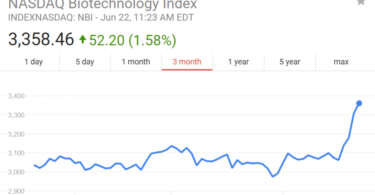165 shots on goal (and counting)
Keith Speights (Ligand Pharmaceuticals): Ligand Pharmaceuticals claims one of the most intriguing business models in the biotech world. The company licenses its technology to other drugmakers. And then Ligand waits for the revenue to flow in.
This business model is already working like a charm. In the second quarter of 2018, Ligand's revenue soared 221% over the prior-year period. Adjusted earnings per share skyrocketed 273%. These results stemmed in large part to the renegotiation of a licensing deal with Chinese drugmaker WuXi Biologics. Ligand also receives royalties from four approved products marketed by its partners.
But the biggest reason to like Ligand is the number of shots on goal the company has. Ligand has more than 165 partnered programs with over 95 partners, including many of the biggest biotechs and pharmaceutical companies in the world. Nearly half these programs are in clinical development or awaiting approval.
I especially like the prospects for Ligand's OmniAb antibody discovery platform. The company's technology supports discovery of antibodies in three animal species: chicken, mice, and rats. Drugs based on antibodies are a rapidly growing market, with worldwide sales projected to approach $240 billion by 2024.
Ligand's shares might look pricey, with the stock trading at more than 45 times expected earnings. However, with plenty of shots on goal for new approvals over the next several years, Wall Street thinks the biotech will grow earnings by an average of 35% annually.
Two pieces of recent good news for this biotech
Chuck Saletta (Portola Pharmaceuticals): In the high-risk world of biotechnology, many investors like to spread their investments around to improve their chances that at least one of their picks works out. Given that backdrop, it's interesting to note that Portola Pharmaceuticals director Jeffrey Bird recently elected to invest around $10 million in Portola's stock, shortly after its shares fell on weak earnings.
As legendary investor Peter Lynch has said, “Insiders might sell their shares for any number of reasons, but they buy them for only one: They think the price will rise.” Of course, a major insider purchase isn't sufficient by itself to justify an investment, but when paired with other news of a more promising future, it can provide a more compelling case.
In Portola Pharmaceuticals' case, that other piece of good news may very well be its recent announcement that it just filed a Prior Approval Supplement for enhanced manufacturing of Andexxa.
Andexxa is already approved to reverse anticoagulation in patients treated with rivaroxaban and apixaban where the patients are at risk of life-threatening bleeding. The Prior Approval Supplement, if approved by the Food and Drug Administration, will enable Portola to supply more hospitals with Andexxa.
With enhanced manufacturing driving the ability to sell more of that product, revenue will likely pick up. As Andexxa is already an approved compound, the risk profile for the manufacturing change Portola is requesting is lower than if the company was trying to gain initial approval for its use. There are no guarantees in biotech investing, but a combination of a large insider buy and decent prospects for increased revenue provides a compelling case to consider Portola today.
High growth at a value price
Brian Feroldi (Supernus Pharmaceuticals): One way that biotech investors can limit their downside risk is by demanding that the companies that they buy are already producing profits. As you can imagine, that's a high bar to clear in small-cap biotechnology land. However, Supernus Pharmaceuticals has already achieved this feat.
Supernus is focused on treating diseases of the central nervous system. Its two primary moneymakers are Trokendi XR and Oxtellar XR, which treat epilepsy and partial seizures, respectively. Both of these drugs are posting sales growth in the double digits. Better yet, the business is scaling beautifully, so earnings are growing at a much faster rate than revenue (EPS growth was 78% last quarter).
While Trokendi XR and Oxtellar XR should continue to drive the company's financial results for the foreseeable future, Supernus also boasts two drugs in phase 3 development that could accelerate revenue and profit growth down the road. SPN-810 and SPN-812 are being studied as hopeful treatments for impulse aggression and ADHD, respectively. If either of them finds their way to market, then Supernus' addressable market opportunity should greatly expand.
Despite the near- and long-term profit growth potential, Supernus' stock has fallen by more than 25% from its recent high because it came up a bit short of its revenue estimate in the most recent quarter. The decline has caused the stock to trade for only 17 times next year's earnings estimates, which I think is quite cheap for a company that is expected to post profit growth in excess of 32% annually over the next five years.
More at: Fool.com
Bonus: Our Stock Pick Of The Year
If there's one stock that is an absolute winner this year in the technology space, it's this one right here.
It's a recommendation that comes from Paul Mampilly— the Wall Street legend who recommended Microsoft early on – and his recommendations are always exceptional.
It’s why, when he was a hedge fund manager, Barron’s named his $25 billion fund “one of the world’s best” and Kiplinger ranked it in the top 1%.
Now, in a controversial new video, Paul reveals a stock that he believes could follow a similar path. He even shows viewers how they can get in before this stock takes off … so you will have the opportunity to become the next “one stock millionaire.”
The last time Paul released a video like this, viewers reported making $121,319 … $627,573 … and even $900,000.








Don,t want to listen to all the verbage. Just give me the names of the stock. I’ll do my own research